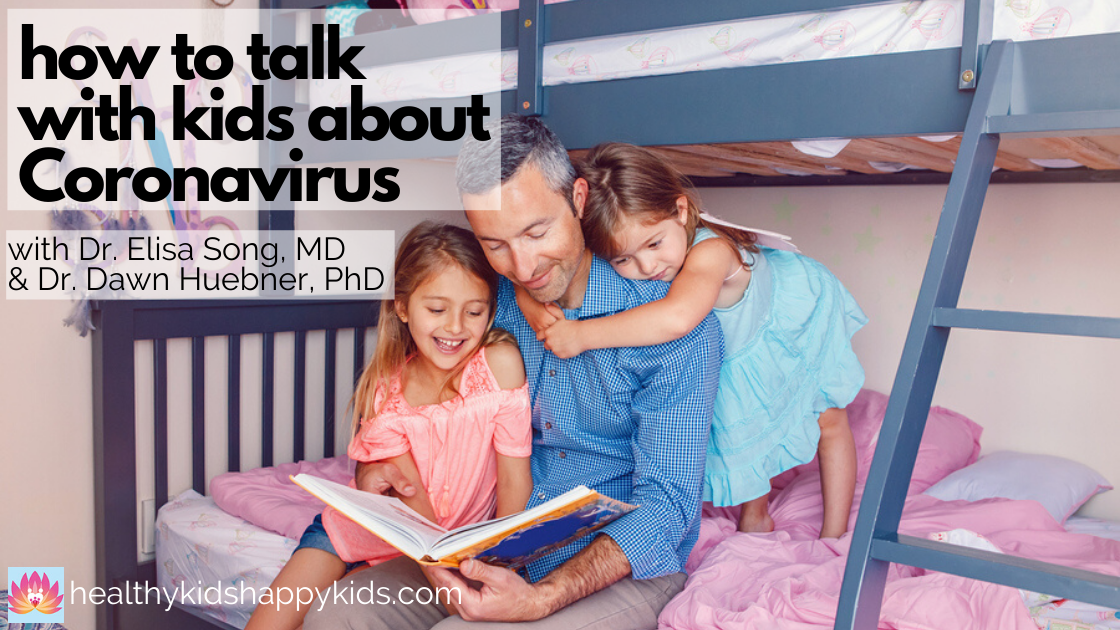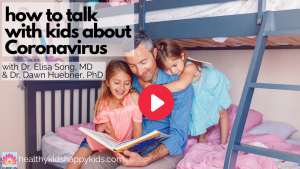
As we hold our collective breath, waiting to see what will happen in the coming weeks as Coronavirus continues to spread throughout the US and the world, some of us are panicking. And even if you’re not panicking, someone around you is. And through this all…
Our children are watching & listening …
And wondering if they should be panicked too.
Kenzi, 10, and Bodi, 8, don’t seem overly concerned. But I know it’s on their minds. Kenzi asked me, “Are we going to get Coronavirus?,” and Bodi wondered, “Am I going to die if I get it?”
Last night, I stopped and really paid attention to our family dinner conversation, and realized just how much Coronavirus had taken over – what supplies do we need, did you hear it’s now in Denver, do we have enough Vitamin C at home, a researcher said the next 2 weeks are going to be crazy, and on and on! We weren’t being hysterical or saying anything that I thought was overly scary (like the latest death toll), but still – to an 8- and 10-year old, all they see is that this Coronavirus thing has their school in a bit of a frenzy and it’s all their parents can talk about, so it must be pretty bad …
And it actually may get pretty bad.
While I’m hoping for the best, I’m preparing for the worst, and want us mamas and papas to all be prepared to help our kids cope through anything that may come their way, now or in the future.
That’s why I teamed up with my very favorite child psychologist, Dr. Dawn Huebner, author of Something Bad Happened: A Kid’s Guide to Coping With Events in the News. to give you insight from a pediatrician and a child psychologist on how to talk with your kids about not just Coronavirus, but about any big, tragic event that may happen in and around their lives, and give your kids the tools to manage their worries and come out the other end even more resilient than before.
In times of stress and crisis, our children look to US, their parents, to make sense of what’s going on, and how they should act and react. WE inform them how to think and feel. WE inform them how to respond to their stress, and what actions are okay or not okay.
Depending on our child’s ages and developmental stage, they are going to have totally different understandings of what Coronavirus means to them. They are hearing truths and mistruths from their peers and grownups around them, and it is up to us, as their parents, to help them put a context to their fears and support them through this uncertain time. And believe me, they are HEARING, and they are LISTENING.
My 8 year-old son, Bodi, came home last night with tears in his eyes and asked, “Is it true that all grandparents are going to die?” – something he had heard from an 8th-grade friend. I’ve heard kids wondering whether it’s safe to eat Chinese food, or that they’re not worried at all because it’s just like having a cold. None of which is true.
Our children are looking at us to interpret what’s going on. They’re reading our facial expressions and body language, listening to the words we’re choosing, and the tone we’re using. They subconsciously and consciously are modeling their stress response after ours. They lack a larger context for their fears and worries. Young children in particular are very literal. When they see us crying, scared, and angry, they are asking themselves, “Should I be as sad and scared and angry?” While we don’t want to sugarcoat and hide the fears that we feel, it’s important to remain calm and model that we can cope with this stress and anxiety positively and that it is not the end of the world. Our kids are looking to us to figure out whether their world is safe, whether they are safe.
In this time of great uncertainty, the only thing that is certain is that there will be more uncertainty. So when we are reeling on the inside and filled with moments of panic and fear, what are some things that we can do to help our children maintain calm and resilience?
Monitor your own reaction
- It’s absolutely OK to let your kids know you’re worried and to share your feelings. But remember, kids are watching us to see how they should process their feelings. So if you’re internally having a freak-out moment, process those first somewhere else before trying to talk with your children.
Listen
- Listen to what your child has to say. Find out exactly what ‘s worrying them, and make sure you haven’t jumped to any wrong conclusions. You may be surprised. Remember, kids are literal. They may actually not be worried about Coronavirus at all, and just really angry that their spring break plans have been cancelled and they’re not going to Disneyland as planned.
- Ask casual questions. Let their questions come out spontaneously. Younger kids may act out what they’re hearing and what they’re worried about in play or song.
- Take their concerns and feelings seriously, even if they seem totally silly to you. Don’t laugh, judge, or minimize. Watch how you react to what they’re saying.
Name it
- Help your kids name the feelings that they’re experiencing. Putting a name to their feelings helps them to talk about them, so that they can begin the process of figuring out how to deal with them. No feeling is too big or too small. They may be sad, scared, nervous, confused, angry, irritated, bored, or any number of other feelings. And if your child isn’t sure how to name it, Dr. Huebner has an illustrated page with faces to help your child give their feeling a name.
Talk with your kids
- Notice I said talk “WITH,” not talk “to”. This is an ongoing partnership, with your child, to navigate these difficult times together.
- Discuss what’s happening in an age-appropriate manner. Use language that they understand.
- Answer the questions that they are asking, literally. Be simple and brief. Don’t read too deeply into their questions.
- Kids DO NOT need to know ALL the details. Don’t offer more than your child wants or needs to hear.
- If you don’t know the answer to their question, it’s OK to tell them you don’t know.
- Share your feelings and thoughts, but stay calm and maintain a neutral expression as you are doing this.
- Be truthful. Children can sense when you are hiding something, and may fill in the blanks with their fears and worries. Answer your children’s questions truthfully, but in age-appropriate language that they can understand.
- Respect their desire to stop a discussion or take a break until another time.
Reassure
- You don’t have to paint a rosy picture, but you shouldn’t paint one of just doom and gloom, either.
- Remind children that the vast majority of people have mild to no symptoms, especially children.
- Children need to feel safe, and they look to their parents to provide that safety. Reassure them that you are there 100% to fulfill this responsibility, and that you will protect them.
Be mindful of media exposure
- DO NOT expose your children to unnecessary media coverage and social media posts about Coronavirus, In fact, don’t expose yourself to unnecessary media. It’s simply too overwhelming and panic-inducing. The media thrives on shock and negativity – this is not appropriate for our kids at any age.
- Resist the temptation to look at your news feed in front of your kids. But if for some reason you absolutely must, then monitor your reactions and facial expressions, and temper those sounds of fear or worry that may surface.
- If you have older children, be WITH them when they are watching the news or reading social media. Help them interpret what’s happening, and understand and express their feelings and thoughts in a calm and rational way.
Maintain routines
- It may seem impossible to maintain routines when school and work closures throw us completely out of routine. But even though the structure of our lives is different, we can maintain routines which help our children (and us!) feel safer.
- School closures and home quarantine should not mean a free-for-all to watch cartoons or play video games until the wee hours. As much as possible, maintain your same schedule for when your child wakes, when they eat, when they play, when they brush their teeth, when they get a bath, and any other activity that’s a part of your family’s routine.
Focus on the positive
- When our brains are on “High Alert” and perceive that “I’m not safe”, our brains actually look for evidence to confirm that danger. Focusing on what is positive is crucial to get our brains out of high alert and to feel safe again.
- Incorporate mindfulness and gratitude into your family’s routines to keep as calm as possible. Easy ideas include the Stop, Look & Listen meditation I explain in my article Mindfulness for Kids, or the “Safe” and “Connected” exercises in Dr. Huebner’s book.
- Let your children know that they can do something with their feelings using the cognitive-behavioral techniques that Dr. Huebner teachers in her book – like Gathering Information, Identifying Helpers, Understanding Likelihood, and Dealing with Feelings.
Take action
- Read Dr. Huebner’s book, Something Bad Happened: A Kid’s Guide to Coping With Events in the News – together, with your child. Something Bad Happened is a self-help workbook for children and their parents to help them work through their worries and gain resilience as they experience big, scary events like the current Coronavirus pandemic.
- Let your children know that they can make a difference. Focus on what they CAN do to help their families, friends, and communities stay healthier and safe – from sending love and gratitude, to sneezing into their elbow and washing their hands properly so they don’t spread germs, to donating items to those in need. Doing something positive for the world, even something small, helps put some of the power back into your child’s hands.
Model love
- In Dr. Huebner’s words, “Resilience is defined as the capacity to recover from adversity. It is an important predictor of health and well-being. By exposing your children to measured bits of real-word events and helping them process their thoughts and feelings, you are helping to build this crucial skill. Together you can learn about, put into perspective, and formulate plans regarding the big, bad things happening in our world. Together you can consciously decide to face adversity with optimism and love.”
And last but definitely not least …
>>>Watch our interview<<<
Dr. Huebner and I discussed this, and so much more, about how to talk with your kids about Coronavirus, and the tools your kids need to navigate these uncertain times. Please, STOP, click the image above, and take the time to watch the video now – it’s that important!
And please be sure to share this very important information with any parents, educators, or caregivers you know who could benefit.
Stay well,
xo Holistic mama doc – Elisa Song, MD

Leave a Reply